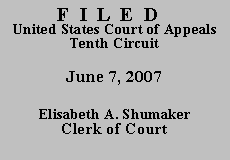

| WILLIAM ERICKSON,
Plaintiff-Appellant, v. BARRY J. PARDUS, Assistant Clinical Director, in his individual and official capacity; ANITA BLOOR, L.C.F. Medical Staff, individually and in her official capacity, Defendants-Appellees. |
|
__ (2007); Slip Opinion at 6. In its opinion, the Court addressed only Mr. Erickson's claim that his Eighth Amendment rights have been violated as a result of his removal from the prison's hepatitis C treatment program, see Slip Opinion at 1, and the Court did not address Mr. Erickson's related procedural due process claim or his separate Eighth Amendment claim relating to an alleged deprivation of hygiene items. We therefore REINSTATE the portions of our prior order and judgment that addressed the latter claims. See Order and Judgment dated September 14, 2006, at 9-12.
In its opinion, the Court held that Mr. Erickson's allegations "concerning [the] harm caused by the termination of his medication" are not "too conclusory to establish for pleading purposes that he has suffered a 'cognizable independent harm' as a result of his removal from the hepatitis C treatment program." Erickson v. Pardus, 511 U.S. __ (2007); Slip Opinion at 5. In light of the Court's holding and having carefully considered the Court's discussion of Fed. R. Civ. P. 8(a)(2), see id. at 5-6 (emphasizing the liberal pleading standards set forth by Rule 8(a)(2), and stating that the standards are of particular importance in pro se cases), we conclude that Mr. Erickson has pled sufficient facts to state a claim under the objective component of the Eighth Amendment's deliberate indifference standard. We also conclude that he has pled sufficient facts to state a claim under the subjective component of the deliberate indifference standard. Accordingly, we VACATE the portions of the order entered by the district court on March 13, 2006, that addressed Mr. Erickson's Eighth Amendment claim pertaining to his removal from the hepatitis C treatment program, and the case is REMANDED to the district court for further proceedings consistent with the Supreme Court's opinion and this order and judgment.
Entered for the Court
Circuit Judge
*. This order and judgment is not binding precedent, except under the doctrines of law of the case, res judicata, and collateral estoppel. The court generally disfavors the citation of orders and judgments; nevertheless, an order and judgment may be cited under the terms and conditions of 10th Cir. R. 36.3.